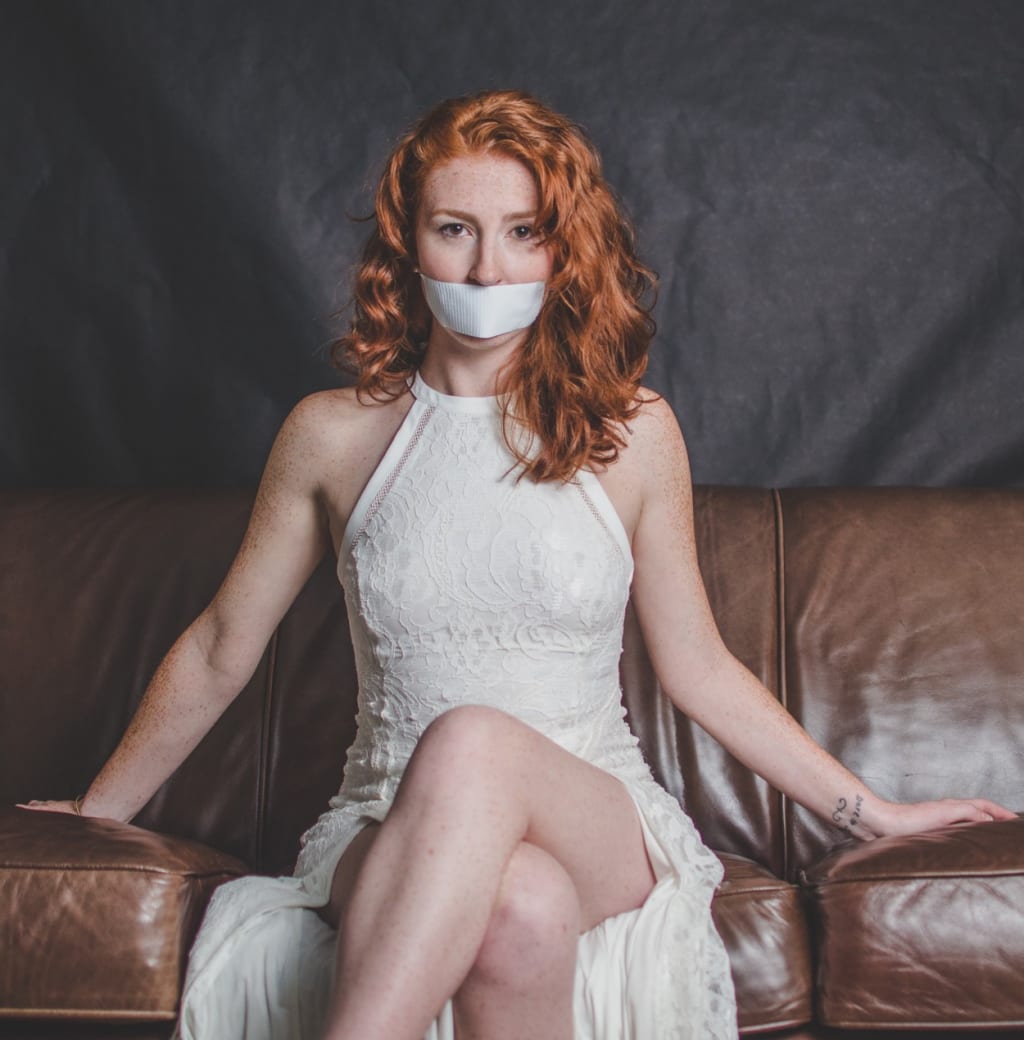I Told My Best Friend She Wasn’t “Allowed” to Call Herself Fat
In an attempt to “help” build her self-esteem, I completely missed the mark.

Like every woman, I’ve been bombarded with media and advertisements telling me I’m not good enough — not pretty enough, not skinny enough, not flawless enough (as if that even exists).
As I tried to navigate this tumultuous territory of self-image and beauty through my teens, I was always surrounded by other girls going through the exact same experience.
We were thrown into the wolf’s den and essentially told to fend for ourselves, but also together.
Society likes to tell us how to savagely critique our physical appearance — so naturally it does a sh*t job at explaining to us how to embrace who we are, including how to love living in our own skin.
As I finished off junior high school at the age of 15, I was just coming out of several years of bullying and compulsive emotional eating in hopes of making the pain hurt a little less.
I entered high school feeling fed up with stupid beauty standards, and I just started to embrace my personality and own it more. I loved listening to Fall Out Boy and wearing Converse. I enjoyed graphic Ts and having a haircut that was low-maintenance enough that I could just roll out of bed and basically be ready for school.
Come high school, my best friend B and I realized that we were basically soulmates.
We’d been classmates for years, and she was actually considered one of the more popular girls in school in junior high when I was bullied.
Physically, she was the biggest among the popular girls. She was enjoyed and celebrated for her sense of humour and her ability to make anyone laugh. She carried this identity as a shield to protect herself.
Plus, she was far better than me at a particular thing — playing the part of being the person popular people wanted her to be. I was always piss-poor at being anyone other than my weird, quirky self.
So imagine my surprise when she started to sit with my other equally “weird” friends at lunch, and she was delightfully as quirky as the rest of us.
Once the facade and walls were torn down, she and I realized we were incredibly similar in so many ways — including our struggle to find comfort in our own skin.
Building a house on a broken foundation.
Come to think of it, B was starting her journey towards a positive self-image far before the rest of us. I’ve only just come to realize that as I’m writing.
In grade 12, anticipating university the next year, we were all enjoying lunch together when B dropped the F-bomb.
She called herself “fat”.
The rest of us were horrified — because society had taught us that “fat” was a bad word.
Bad = negative. Negative = unhealthy. We were horrified and didn’t want her to be actively tearing herself down and crushing her own self-esteem.
You could see how our logic could be sound, as a few naive young women still trying to figure out how to love ourselves.
We honestly didn’t know any better.
We declared that she was “not allowed” to call herself “fat”. In our eyes, “fat” was a dirty word.
“You can only talk about yourself in positive words! You’re beautiful and amazing, and curvy! Guys love curvy, curvy is awesome!”
I smile sadly at these memories. We really thought we were helping — we really thought we were protecting her from herself if we didn’t allow her to use “negative” words in her self-descriptions.
We were so incredibly, innocently in the wrong. We didn’t realize how misunderstood this perspective was at the time.
“Fat” is not a dirty word.
It’s 1st year university.
I’ve landed my first boyfriend ever, and he’s accepted me for my graphic T’s and my love for listening to Fall Out Boy and Good Charlotte, so obviously he must love me for me and I have this self-love thing figured out (lol, wrong).
I’m studying French language, my best friend B is studying Opera.
We’re more comfortable in our own skin, but still have a lot to learn if we’re ever going to get close to loving ourselves the way we deserve to.
B’s birthday party is a couple of weeks before Christmas. It’s being held at the apartment of one of her new music friends — she has a lot of those now. I only recognize about 50% of people at the party.
We’re drinking wine with one of her newest friends — a remarkably confident and powerful woman. She appears to be so comfortable in her own skin, and is very open about her sexual triumphs (which was just fascinating for the innocent 19-year-old me).
B really admires her new friend — they have similar body shapes, and B has explained to me that they share many experiences (ones I am not privy to, respectfully, as a medium-sized woman).
Then B is talking, and she refers to herself as “fat”.
I don’t think, it’s just instinct, carried over from our high school days.
I wack her on the arm, and say, “You’re not allowed to call yourself that.”
B’s new friend, we’ll call her A, chokes on her wine.
“Wait, what? Why can’t she call herself ‘fat’’?”
I shrug, still oblivious to the fact that I’m not helping B at all. “Because,” I say matter-of-factly, “I don’t want her using words that tear her down to describe herself. She's beautiful!”
What happened next was pretty remarkable. A could have bitched me out for my ignorance, but instead, she treated me with compassion and used this moment as a powerful teaching opportunity. I’ve never forgotten her words.
“Honey, ‘fat’ isn’t a bad word. It’s a fact — she’s big, she’s a fat girl — so am I, and that’s okay. Fat girls are beautiful, too.”
I wasn’t embarrassed by being called out. I was in absolute awe.
As if this was a life-changing prospect to me — because it was.
I stared at A, entranced. And said (as naive as it sounds today), “Wow… that’s amazing. I’ve actually never heard someone put it that way. Thank you for saying that.” I then turned to B, understanding in that moment how backwards my attempts to encourage her healthy self-esteem had been all these years. “I’m so sorry, I really thought I was helping you.”
There was a relief in B—I saw a massive weight lift off her shoulders in that moment.
Someone had finally put into words the sentiment I can only imagine she’d been trying to find the words to communicate for years.
She threw a loving arm around my shoulder and gave me a hug.
“It’s okay. I know you meant well. You just didn't know any better — because you’re skinny.”
Final word.
In my adult life, I’ve never been classified as “fat”. In my last years of junior high as a teenager (and B will attest to this as well), I certainly was. But that weight shed off early into high school when I no longer found myself in need to lean on food for emotional support.
I’m also very rarely referred to as “skinny” in my adult life. I fall pretty-smack-dab in the middle — landing in the in-between of the charts for what would be considered a “Medium” size in clothing.
For this reason, I don’t feel comfortable speaking for or to the realities of being a beautiful fat woman. That’s not my story, so there is no room for my voice in that dialogue, claiming I “understand what it’s like”.
What I can speak to, however, is my experience in realizing that I have spent a majority of my life living with a very skewed view of what “fat” means.
Fat is not a bad word. Fat is not a distasteful word. Fat is not a shameful word.
Fat is just a word.
A word to describe a body type. A word which carries a negative weight only because society has made a practice of shaming those who can be described as this word.
And that’s wrong.
The more negative power we give to this word, the more harm it can do.
In the wise words of A, who has authority to speak on this topic and who took the opportunity to educate a fellow woman’s ignorance rather than tear her down for it (for which I am eternally grateful):
“Fat” isn’t a bad word. It’s a fact, and that’s okay. Fat girls are beautiful, too.
A version of this article was originally published by the author on Medium.






Comments
There are no comments for this story
Be the first to respond and start the conversation.